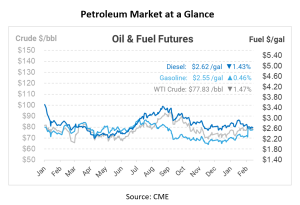
The 3 Secrets Top Utility Fleets Use for Fueling
In the fast-paced industry of utility services, every second counts when maintaining and restoring essential power services. Fleets are a cornerstone of responding to service outages, so they must be ready to deploy at a moment’s notice. For that reason, your fueling program is an important operational consideration, empowering your business to respond quickly to customer needs. Strategic fuel management decisions can lead to substantial improvements in operational agility and cost-effectiveness.
In today’s article, we’ll explore three essential tips used by the largest power and gas companies for utility fleet fueling, offering insights into fueling modes, consolidating purchases, and emergency response preparedness. Implementing these strategies has helped leading utilities streamline their processes and ensure their vehicles remain operational.
1 – Optimize Fueling Methods
Choosing how your fleets receives fuel can be a difficult choice. Fleet managers can leverage a mix of fueling modes to ensure drivers have the fuel they need to stay on the move. The top utility fleets understand the value of maintaining a mix of fueling methods, based on the needs of their fleet.
For most utility fleets, a universal fleet card is the pillar of the fuel program. Having the ability to fuel at any station, anywhere within your service footprint, is critical to make sure your trucks stay on the move. Since your trucks could be called to rural areas, you have to have a fleet card that works everywhere while tracking the important Level 3 data needed to stay efficient.
Beyond the fleet card, your company may consider bulk fueling to cut costs. With the utility trucks coming back to the lot regularly, having a bulk tank on-site can reduce costs and save your drivers time – they don’t need to waste time looking for a gas station. Depending on the number of trucks at your location, you may consider either a permanent FTL bulk tank or a smaller rental tank. Either way, you’ll get better prices and have the reliability of maintaining your own storage.
A hybrid between these two methods, mobile fueling, brings the benefits of wholesale-based pricing along with the convenience of individual vehicle filling. With mobile fueling, your fuel suppliers delivers fuel into each vehicle, so your drivers can immediately hit the road and stay full all day. Although this service costs more than bulk fueling, it often can present some savings (or at least, comparable pricing) versus retail while saving driver time.
With Mansfield, you can consolidate all of your transactions – retail, cardlock, backyard bulk, and mobile fueling – in a single platform, giving you insights into every drop of fuel. With detailed transaction data, you can monitor for fraud, theft, inefficient purchasing, and more – reducing your overall volume and costs. Your company can leverage a blend of fueling solutions, administered through one fuel supplier whose mission is to empower your fuel program, not pull you towards one single solution.
2 – Consolidate All Fuel Purchases
In addition to fleet fuel, some power generators treat fuel as a power source. When the economics make sense, they can switch from using coal or natural gas to an oil-powered source, burning tens of thousands of gallons in a short timeframe.
Imagine a massive utility fuel tank with a line of 10 fuel trucks ready to drop a load of fuel to keep the power generation going. This is the reality in many parts of the country – and it doesn’t happen without intense logistical planning and preparation. Yet, when companies make the call to switch over to diesel power, they may need those 10 trucks dispatched and ready within 24 hours. If your business uses diesel fuel as a supply source, you need to partner with a reliable and efficient supplier capable of meeting such substantial demands promptly.
By combining these ad hoc fuel purchases with your broader fuel program, you’ll have a tighter relationship with your fuel supplier, so they’re more in-tune with your needs and ready to deliver quickly. That means overall lower prices and better service when you pull the trigger on switching to oil-based power.
3 – Have an Emergency Response Program
Emergencies like hurricanes and winter storms test the resilience of utility fleets. During these critical times, the primary focus shifts to keeping the fleets on the road, ensuring they can continue their vital work without facing fuel shortages. Yet it’s these times that also present the biggest disruption to fuel supplies. When the power is out, the fuel stations that typically keep your trucks on the road could be offline or out of fuel – and when seconds count, you certainly can’t waste time searching for one that is open.
The top utility fleets have a robust emergency response strategy to ensure fueling when and where it is needed. No different than protecting your business assets via insurance, you want to protect your company’s ability to operate, service your customers, and generate revenue by getting an insurance policy on your fuel. With flexible components, customers can design an emergency program according to their needs, including temporary fuel storage tanks, emergency fleet cards, dedicated fuel trucks, and redundant supply contracts in nearby markets.
This proactive approach guarantees that even in the event of unforeseen natural disasters or emergencies, utility fleets remain fueled, functional, and focused on their duties, not on getting fuel.
Fueling Management Expert
When lines go down, can you be sure you’ll have the fuel you need to respond? Now you can. Mansfield Energy has a proven track record as a trusted partner for utility companies. As a supply-agnostic company, we help you navigate the multitude of options available and determine the right blend for your business. Our bigger reach, broader solutions, and better advice serve as the foundation for a successful fuel program that maximizes cost savings and operational efficiency.

This article is part of Daily Market News & Insights
MARKET CONDITION REPORT - DISCLAIMER
The information contained herein is derived from sources believed to be reliable; however, this information is not guaranteed as to its accuracy or completeness. Furthermore, no responsibility is assumed for use of this material and no express or implied warranties or guarantees are made. This material and any view or comment expressed herein are provided for informational purposes only and should not be construed in any way as an inducement or recommendation to buy or sell products, commodity futures or options contracts.





